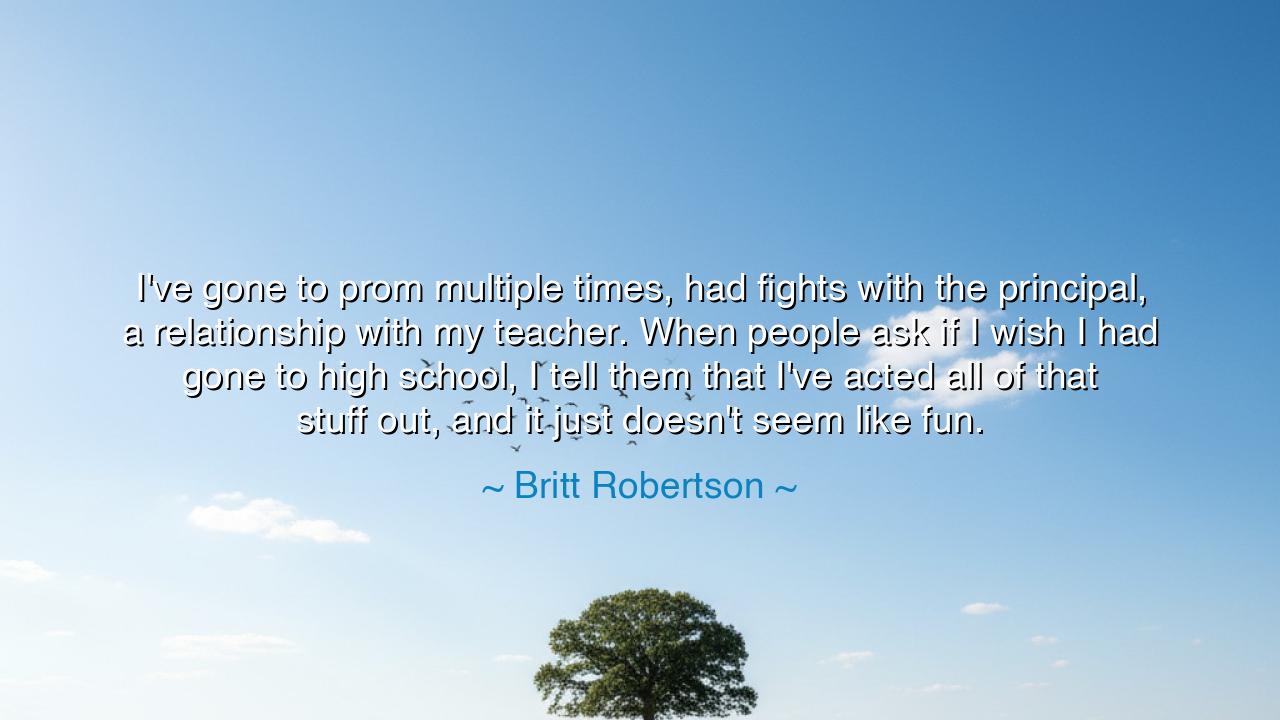
I've gone to prom multiple times, had fights with the principal
I've gone to prom multiple times, had fights with the principal, a relationship with my teacher. When people ask if I wish I had gone to high school, I tell them that I've acted all of that stuff out, and it just doesn't seem like fun.






Britt Robertson, reflecting on the unusual path of her youth, once said: “I've gone to prom multiple times, had fights with the principal, a relationship with my teacher. When people ask if I wish I had gone to high school, I tell them that I've acted all of that stuff out, and it just doesn't seem like fun.” These words carry within them the strange paradox of the actor’s life: that through performance one may live out experiences that others yearn for, only to discover their hollowness when stripped of reality. In them, Robertson acknowledges that appearance and essence are not the same, and that what may glitter in the imagination often fades in the reenactment.
The meaning of this reflection lies in the tension between performance and reality. On the stage or screen, the actor may wear a thousand lives, encountering conflict, love, and loss in condensed form. But this is a life of simulation, and through it Robertson came to see that the rituals of adolescence, so often glorified, did not hold the same allure for her. She had rehearsed them so many times that their mystique dissolved. What others long for as milestone experiences, she perceived as roles already played, stripped of the wonder that might accompany them in reality.
The origin of such insight can be traced to the ancient understanding that art both mirrors life and transforms it. The Greeks in their tragedies showed kings humbled, lovers betrayed, and warriors broken — allowing citizens to taste the sweetness and bitterness of human fate without enduring its full weight. Actors have always been vessels through which society experiences its own struggles. Robertson’s words remind us that to live too much in the realm of enactment may rob one of the longing that gives real life its depth.
History gives us examples of this. Consider Sarah Bernhardt, the legendary French actress, who lived more roles on stage than most could dream in a lifetime. She played queens, saints, courtesans, and warriors, embodying passions and sorrows that consumed entire nations. Yet when asked about her private life, she often admitted it seemed pale compared to the grandeur of her stage experiences. For her, reality and performance blurred, and what others craved as real adventure had already been exhausted in her art. Robertson, in her way, speaks of the same paradox: that too much simulation of life may make its ordinary experiences seem thin.
Yet there is also a deeper wisdom here: that glamorized experiences are not always as fulfilling as they appear. Prom, rebellion, romance — these rites of passage, so central to the mythology of adolescence, are often fleeting, awkward, and imperfect in reality. Robertson’s comment reveals a liberation: she does not feel deprived by missing them, for her work showed her their essence, and it was not as radiant as culture often insists. In this way, her words challenge the illusion that certain milestones are necessary for a full life.
The lesson for future generations is clear: do not idolize experiences for their reputation alone. Whether prom, rebellion, or romance, do not imagine them as golden keys to fulfillment. The true value of life lies not in checking off rituals, but in finding meaning in authenticity. Better to live your own truth, however simple, than to chase borrowed ideals of what life "should" be.
Practical action must follow. Seek experiences that are real to you, not those society tells you are essential. If you miss a milestone, do not despair, for life offers endless ways to grow, to love, and to discover yourself. And if you feel envy of what others have lived, remember Robertson’s words: even those who have enacted those moments may find them empty. What matters is not whether you pass through the same gates as everyone else, but whether you walk your path with honesty and depth.
Thus, Britt Robertson’s reflection stands as a quiet teaching. Performance is not the same as living, and even living is not about imitating others’ paths. Do not be deceived by glamor or by expectation. Life’s truest richness lies in authenticity, in discovering your own meaning, and in refusing to measure your worth by the rituals others glorify. For when the lights fade and the performance ends, it is not the role you played but the truth you lived that will echo across time.






AAdministratorAdministrator
Welcome, honored guests. Please leave a comment, we will respond soon